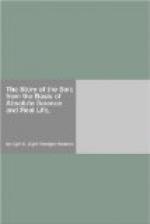“About how much money do you get for an acre of tobacco?” asked Percy.
“That varies a lot with the quality and price—sometimes $100—sometimes $300, when the trust don’t hold the price down on us. We can raise good tobacco and good tobacco brings us good money. We can always manure an acre or two for tobacco and get our groceries and some clothes now and then, and that’s about all anybody gets in this world, I reckon. But taxes are mighty high, I tell you. About $75 to $80 I have to pay. Are taxes high out West?”
“We pay about forty to fifty cents an acre in the corn belt,” Percy replied; “but, in a course I took in economics, I learned that the taxes do not vary in proportion to land values. Poor lands, if inhabited, must always pay heavy taxes; whereas, large areas of good land carry lighter taxes compared with their earning capacity. You must provide your regular expenses for county officers, county courthouse, jail, and poorhouse, about the same as we do. Your roads and bridges cost as much as ours; and the schools in the South must cost more than ours, for a complete double system of schools is usually provided.
“But did you say that you paid fifty cents an acre in taxes?” asked Mr. Jones.
“Yes, about that, in the corn belt,” replied Percy, “but not so much in Southern Illinois where the land is poor. I think the farmers in that section pay taxes as low as yours. Perhaps twenty cents an acre.”
“Do you mean to say that you have poor land in Illinois?”
“Yes, the common prairie land of Southern Illinois must be called poor as compared with the corn belt land. There is a good deal of land in Southern Illinois that was put under cultivation before 1820, and eighty crops must have made a heavy draft upon the store of plant food originally contained in those soils.”
“Only since 1820? Why, we began to till the soil right here, Young Man, in St. Mary County, in 1634 and don’t you know, Sir, that we had a rebellion here as early as 1645? Yes, Sir, that was one hundred and seventy-five years before 1820. So you’ve raised only eighty crops and the land is already getting poor, and we’ve raised two hundred and fifty crops—well, maybe, not quite so many, for we’ve been giving our land a good deal of rest for the last fifty or sixty years; but my grandfather used to raise twenty-five bushels of wheat to the acre with the help of a hundred pounds of land-plaster, and I’ve no doubt I could do it again today if I cared to raise wheat, but one acre of tobacco is worth ten of wheat, so why should I bother with wheat?”
“Twenty-five bushels of wheat per acre,” repeated Percy, half to himself. “The total supply of phosphorus still remaining in the plowed soil would be sufficient for only twenty more crops like that. Two hundred years of such crops would require 1600 pounds of phosphorus, making nearly 1800 pounds at the beginning, if it all came from the plowed soil. That is one and a half times as much as is now contained in our common corn belt prairie land.”




